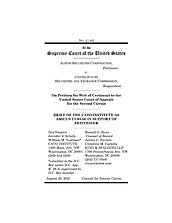It takes a lot of time and effort for an agency to vet its proposals with the public, as required by law. But the Securities and Exchange Commission (SEC) found a loophole through these procedural safeguards simply by enforcing rules drafted by another agency. Forty years ago, the SEC prospectively incorporated by reference the Treasury Department’s bank secrecy rules. That is, the SEC adopted a different agency’s existing rule and any subsequent amendments made by that other agency.
Since then, the Treasury Department has significantly changed its bank secrecy rule through public notice and comment procedures. Despite not having participated in this rulemaking, the SEC enforces the amended rule as its own. Making matters worse, the SEC claims authority to impose harsher penalties under a lower evidentiary standard than the agency—the Treasury Department—that wrote the rules. Using this “borrowed” authority, the SEC brought a civil enforcement action in a federal district court against Alpine Securities, alleging record-keeping violations. Rather than settle, the company counter-sued, arguing that the SEC’s administrative power grab runs afoul of congressional intent.
The district court sided with the government and imposed a $12 million fine against Alpine Securities. The Second Circuit affirmed. Now, the challenger seeks Supreme Court review. Today, the Cato Institute filed a brief in support of the petitioner. We urge the Court to rein in the SEC’s purported authority to freeride on another agency’s rulemaking.



